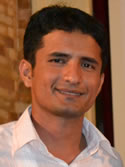Written by Janak B.C.
 Let me begin with an exhilarating saying by Tertullian who states in his famous work Apologeticus or Apologeticum (An Apology) – “The blood of the martyrs is the seed of the church.” Christians are not allowed to defend themselves- as long as they are called Christians, they shall be persecuted.
Let me begin with an exhilarating saying by Tertullian who states in his famous work Apologeticus or Apologeticum (An Apology) – “The blood of the martyrs is the seed of the church.” Christians are not allowed to defend themselves- as long as they are called Christians, they shall be persecuted.
Justice and rights are mere words which could not be advocated by them. If this is the case, perhaps we need to articulate the life of prophets in the Old Testament and Jesus himself who stood for the rights of the voiceless people. In relation to this, I would like to throw some lights on the persecution in Odisha and some of the loophole of the mission in Odisha which need to consider seriously.
Last December, I was in Odisha for some personal assignment. I arrived at Bhubaneswar in the morning of 8th December, 2011. After spending couple of days in the train, I was indeed physically exhausted. On the same day, I had to rush towards Kandhmal since our programme was supposed to begin from 9th onwards. Life was quite challenging in the Kandhmal. I had heard a lot about the Christian persecution in the Kandhmal. In fact, the news captured the attention of the whole world. People poured out their sympathy towards the Kandhmal victims. The brutality of fundamental groups were criticized and condemned from every angle. Nevertheless, the ground situation could not turn into betterment. Pastor Ullas Pani was kind enough to show us the route to Kandhmal. He even showed us a Christian colony which was completely demolished by the extremists and fundamentalists during the attack in 2008. Now, there were few huts which were re-constructed through the government’s relief fund.
This led me to think about another incident while discussing about the Odisha persecution. Coincidently, I had an encounter with a friend of Graham and Gladys. I was quite shattered hearing from her. She even didn’t want to remember about the incident that took place in 1999. I bitterly cried in the heart that Lord, why it is difficult to understand the secret of your love that even drives your people to the point of death? She said to me, “Janak! Graham was not a kind of person who could provoke others through his works and speech. I am not portraying his humility just because he was killed, but if a truth be told, he was a humble man.” The person, with whom I was chatting, was so close to Graham. She was known to Graham even before Graham was engaged to Gladys. I asked her whether she has read a book “Burnt and Alive” which talks about the whole episode of Stain’s life and tragedy that happened in Odisha. She simply said, “Please, do not ask me about this. I do not want to read that book. The day he was brutally killed, I rang up to Graham’s home in the morning whether I could visit him. In response, I could hear a crying and shouting, “‘Mam! He has been burnt alive….burnt alive…burnt.’ I literally fell down and could not even believe. In fact I was in touch with Gladys and now it’s been days that I lost contact with her after she left Odisha.”
Our main job in Kandhmal was to construct a literacy primer for Kui people. Kandhmal accumulates of ten lakhs of population, including the majority of kui speaking people. Out of the total population, 80% of people come from the Kui tribe which is one of the major tribal languages in the state of Odisha. Kui people do not have their own literature as we could find in Odiya. Most of the Kui finds difficulty to understand Odiya though they use the same script. Taking this into consideration, Chrystella from Literacy Evangelism International took up the burden of constructing a primer for the Kui people that these people would have got an access to read the Bible into their own language.
Odisha is known for the land of persecution and militancy, where common people have been brainwashed by the other fundamentalists and extremists. I presume that the lack of education could be one of the reasons for the rise of these disturbances. After couple of days of the workshop, the participants became much acquainted to me. They started to share their stories that had happened in 2008 persecution. Most of them were the local pastors who come from the Kandhmal areas. Manu is a pastor who is from the Kandhmal area. He is gifted in music and singing. He told me the story of Kandhmal riot:
Fundamentalists didn’t even bother anyone who confessed Christ as their Lord. Either you had to join the group, or you would have to die. We as a family ran away to jungle in different directions when the mob came roaring from another village. I peeped from a far, blazing my house and properties in fire. They took away some of the things from the house. They took away all my musical instruments that I loved much more than my life. Everything was turned into ashes after few minutes. They destroyed whole Christian village, and killed some of my friends as well. The old and women, who could not run away, were caught and killed brutally. Most of the villagers were scattered to the jungles. We could spend days and nights without food and have to survive by drinking water and jungle fruits. We didn’t even feel hungry due to the fear and anxiety. We were just anxious about our life.
Persecution and Church’s response have to be re-articulated and evaluated in order to understand a clear road map of the Christian mission. I would highlight two major factors that have hindered God’s kingdom in Odisha. After meeting a couple of leaders, I could grasp a part of the facts of the ministerial approach and their understanding about Evangelism. Correct me if I am wrong! Nevertheless, I strongly stand with the biblical teachings. Nowhere in the Bible, have I seen any significance about the conversion without repentance. A Christian cannot be a Christian if he has not repented his sins. I think we still hold some of the foggy idea of evangelism that we give much priority to the conversion than the repentance. I could sense this feeling in Odisha that a notion of conversion is higher than confessing the sins and accepting Christ. I doubt on the People Movement Approach of McGavran which the author has widely articulated in the book Understanding Church Growth. In fact he defends this not as a theory rather a sober recital of easily observable facts. Nevertheless, I do not accept this fact that numerical growth without reaching the core of the matter does not give any significance, therefore, may lead the people towards more to the conversion, overlooking the repentance.
The other hurdle is our approach towards the ministry. I wonder why this fact is no more widely known by the Christian leaders. Soon after the persecution, the relief and aid came to Odisha from all over the world. The saddening part is that many people, who are the real victims, have hardly been benefited. The lack of the fund management and accountability has been a part of the setback of the Christian leaders in Odisha. In a simple term, we could see that leaders have a difficulty in sharing to others what they have. Instead of this, they easily can look up to the foreign help. I am sure that this is the cancer in Christian ministry that is not going to help God’s kingdom at any cost.
In summary, Christianity needs to check their missional stride in India. I think we should be careful in checking our approach towards the Mission. Is it provoking mission that we are holding on, or is our mission appealing to people, or is our mission provides the light in the darkness and life to the lost one? The need of the humanity is to find the life and security in God. Tertullian was not wrong when he said that ‘the blood of the martyrs is the seed of the Church.” We just need a vision that would see the cries of the martyrs, who gave up their lives for us that we would see the divine light and vision for the lost one.
Republished in new layout 20-May-2013





















Discussion about this post